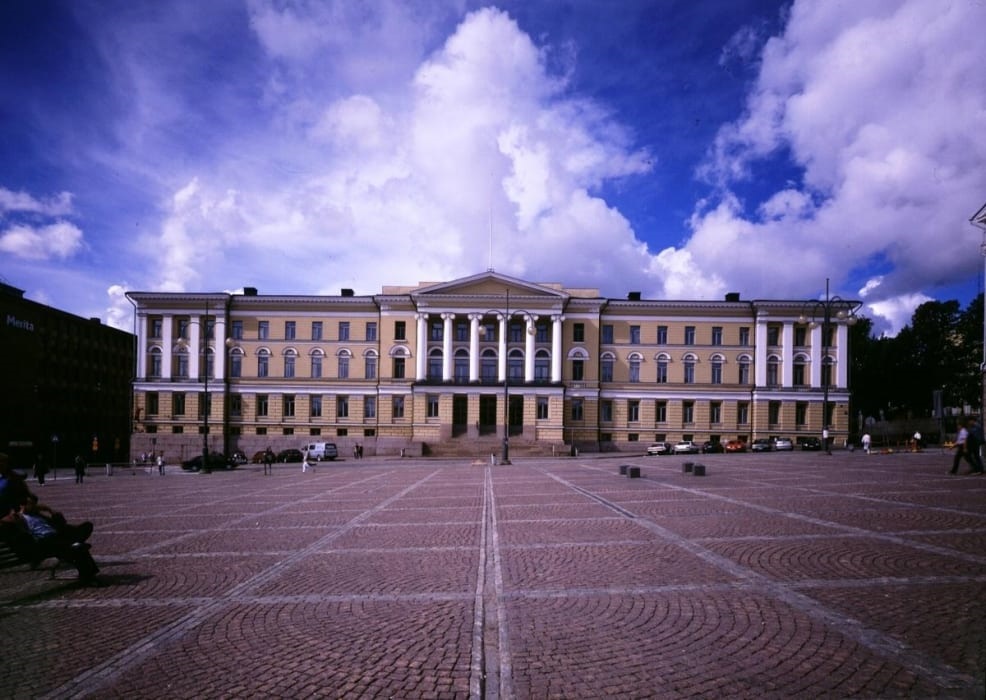
University of Helsinki
University of Helsinki was founded in 1640 and is the oldest and largest university in Finland with leading multidisciplinary research universities in Europe, with over 30,000 students and 4,000 researchers and staff,The university has 11 faculties across four campuses in Helsinki, as well as a few other locations in Finland It offers bachelor’s, master’s, and doctoral degrees across a wide range of academic disciplines, including the natural sciences, humanities, social sciences, law, theology, and more. Notable academic fields and research areas at the University of Helsinki include medicine, life sciences, computer science, physics, and environmental studies.
The university is highly ranked internationally, often placing among the top 100 universities worldwide in various global rankings and member of several prestigious international university networks and associations, such as the League of European Research Universities.In 1827, the university was moved from Turku to Helsinki, which had become the capital of the Grand Duchy of Finland under Russian rule.
Research
The University of Helsinki is a major research institution, with a focus on high-impact, multidisciplinary research,Key research strengths include life sciences, environmental sciences, materials research, and digital humanities, The university partners with industry, government, and other academic institutions on various research projects and initiatives.It operates several specialized research centers and institutes, such as the Helsinki Institute of Physics and the Helsinki Institute of Sustainability Science.
Research Focus
The university has established several key research priority areas that build on its existing expertise and address important global challenges,Sustainability, climate change, and the environment,Digitalization and artificial intelligence, Health and wellbeing,Materials and quantum physics and Social justice and equality
The university conducts cutting-edge, interdisciplinary research across its various faculties and research centers.
Research Funding
The University of Helsinki is highly successful in securing competitive research funding from national and international sources, including:
The Academy of Finland, a major Finnish research funding agency
The European Union’s Horizon research and innovation program
Prestigious private foundations and industry partners
The university has extensive collaborations with other leading research institutions, universities, and organizations around the world, facilitating knowledge exchange and joint projects.
Research Impact
The research conducted at the University of Helsinki has a significant impact, as evidenced by its high citation rates and recognition of its academics and researchers,The university also has a strong track record of commercializing its research through spin-off companies, licensing agreements, and collaborative ventures with industry.
It operates several incubators and accelerators to support the translation of research into real-world applications and innovations.
Campus and Student life
The university has modern, well-equipped facilities, including state-of-the-art laboratories, libraries, and cultural venues. Students have access to a wide range of sports and recreational facilities, including gyms, playing fields, and student unions, The university offers extensive support services for its students, including academic advising, mental health resources, career counseling, and disability services.
Student life at the University of Helsinki is vibrant, with a wide range of student organizations, sports clubs, cultural events, and recreational activities and student union, are one of the most active and influential student unions in Finland, advocating for student interests and organizing various events and initiatives.
Many students also engage in research projects, internships, and entrepreneurial activities during their studies.The university operates several world-class research facilities and institutes, such as:
The Kumpula Science Campus, which houses advanced laboratories for physics, chemistry, and computer science research
The Viikki Campus, which is dedicated to life sciences and environmental research
The Helsinki Institute of Physics, which participates in major international physics projects like CERN
The university also leads or participates in numerous large-scale, collaborative research initiatives, including:
The Helsinki Institute of Sustainability Science, which brings together researchers from across disciplines to address sustainability challenges
The Helsinki Center for Data Science, which focuses on advancing artificial intelligence and machine learning research
The university offers a wide range of courses and degree programs taught in English, spanning various academic disciplines and makes the university an attractive destination for international students seeking high-quality education in Norway.
Admission requirements
The admission requirements for the University of Helsinki’s English-taught programs vary depending on the specific degree program, but generally include the following key elements:
Educational Background
Applicants must have completed a relevant Bachelor’s degree (or equivalent) for Master’s programs.
For Doctoral programs, applicants typically need to hold a relevant Master’s degree.
The required field of study depends on the program the applicant is applying for.
Language Proficiency
Applicants must demonstrate proficiency in the English language, typically through a recognized test such as TOEFL, IELTS, or Cambridge English.
The required minimum scores vary by program, but are generally in the range of IELTS 6.5-7.5 or TOEFL iBT 92-100.
Application Materials
Copies of academic transcripts and degree certificates
Curriculum Vitae (CV) or resume
Statement of purpose or motivation letter
Letters of recommendation (typically 1-2)
Copies of relevant test scores (e.g., TOEFL, IELTS)
Deadlines and Admission Cycles:
The university has specific application deadlines for each admission cycle, which are usually in January/February for the following academic year.
Some programs may also have additional admission rounds or rolling admissions.Applications are evaluated based on the applicant’s academic merits, language proficiency, and fit for the program.
Depending on the program, the selection process may involve interviews, entrance exams, or other assessments.
